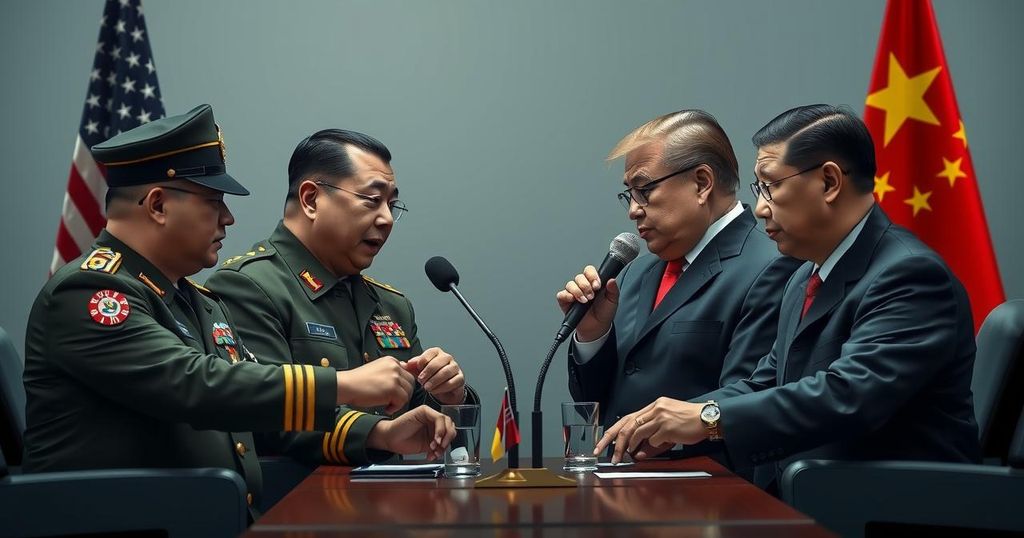Politics
AND, ANDRIY YERMAK, ANTONY J. BLINKEN, ASIA, BEIJING, BIDEN, BIDEN ADMINISTRATION, CHINA, DANIEL J. KRITENBRINK, DEFENSE, DEPARTMENT, EDWARD WONG, ENERGY INFRASTRUCTURE, EUROPE/ASIA, GEOPOLITICS, INTERNATIONAL RELATIONS, JAMES O ’ BRIEN, KURT CAMPBELL, MILITARY DRILLS, MOSCOW, NEW YORK TIMES, NORTH AMERICA, NORTH KOREA, RUSSIA, STATE DEPARTMENT, THE NEW YORK TIMES, THE TIMES, TIMES, U. S, UNITED STATES, WASHINGTON, XI, XIE FENG
Omar El-Sharif
U.S. Engages China to Mitigate North Korean Military Support for Russia
The Biden administration is reaching out to China to address concerns regarding North Korean troops potentially aiding Russia in Ukraine. U.S. officials believe China may be wary of the growing partnership between North Korea and Russia, leading to diplomatic discussions to mitigate these developments. Recent missile tests by North Korea have further intensified global scrutiny and prompted higher-level conversations between U.S. and Chinese officials.
The Biden administration is engaging with China to intercede against North Korean troops potentially assisting Russia in the ongoing conflict in Ukraine. U.S. officials are articulating concerns regarding the troop movements to China, elucidating that Beijing may harbor apprehensions about a closer collaboration between North Korea and Russia. Recent assessments have suggested that this alliance poses a challenge to China’s traditional influence over North Korea, its historic ally. The perceived military cooperation between the two nations escalates tensions, drawing increased international attention and involvement into East Asian security issues, which China prefers to handle with autonomy. Recently, North Korea conducted a significant intercontinental ballistic missile test, its first in nearly a year, which has heightened alarms on the international stage. In response to these developments, American officials have formally communicated these issues to their Chinese counterparts, with the State Department expressing its concerns about troop deployments and their implications for regional security. As part of this diplomatic engagement, Deputy Secretary of State Kurt Campbell and other high-ranking officials met with Chinese diplomats to discuss these pressing matters. Secretary of State Antony Blinken has also been in contact with high-level Ukrainian officials regarding this situation, indicating a concerted diplomatic approach to manage the unfolding crisis.
The relationship between China, North Korea, and Russia has been complex and shifting. China has historically served as North Korea’s main ally, providing it with economic and military support. However, the recent deepening of ties between North Korea and Russia, particularly as North Korea considers providing military assistance to Moscow amidst the Ukraine conflict, raises significant concerns for China. Such an arrangement could dilute China’s influence over North Korea, a situation Beijing is likely to find troubling given its strategic interests in the region. This geopolitical tension is compounded by North Korea’s missile tests, which reaffirm its military ambitions and invite international scrutiny, pushing the U.S. to seek collaboration with China to address these developments.
In summary, the Biden administration’s appeal to China to intervene against North Korean military cooperation with Russia reflects deepening concerns over the geopolitical ramifications of this alliance. The U.S. recognizes that a strengthened partnership between Moscow and Pyongyang undermines Chinese influence in the region, prompting diplomatic engagements aimed at averting further escalation. The international community remains watchful as North Korea continues to enhance its military capabilities, thereby necessitating ongoing dialogue and cooperation among major powers.
Original Source: www.nytimes.com





Post Comment